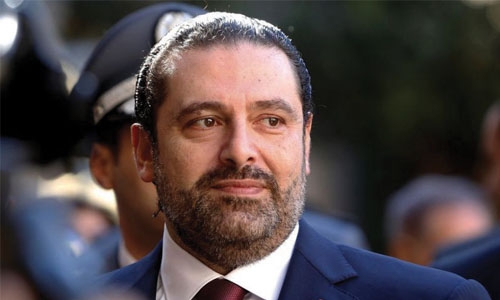Lebanon PM Hariri shelves decision to resign
Beirut : Lebanon‘s Saad Al Hariri yesterday shelved his decision to resign as prime minister at the request of President Michel Aoun to allow for dialogue, easing a crisis that had deepened tensions around the Middle East.
Hariri made his announcement after returning to Beirut for the first time since he quit abruptly in a November 4 broadcast from Saudi Arabia.
At the presidential palace near Beirut, Hariri said he hoped this move would open “a new gateway for a responsible dialogue…that deals with divisive issues and their repercussions on Lebanon‘s relations with Arab brothers.”
“I presented today my resignation to President Aoun and he urged me to wait before offering it and to hold onto it for more dialogue about its reasons and political background, and I showed responsiveness,” he said in a televised statement.
Hariri said all Lebanese must commit to keeping the country out of regional conflicts, a reference to the powerful, Iran-backed Hezbollah whose regional military role has alarmed Saudi Arabia.
Lebanese state officials and senior politicians close to Hariri have said Riyadh forced Hariri to quit and held him in the Kingdom, which Saudi Arabia and Hariri have denied.
The resignation shocked even Hariri’s aides. His return to Lebanon, late on Tuesday night, followed an intervention by France.
Aoun, a political ally of Hezbollah, had refused to accept the resignation on the grounds that Hariri declared it from abroad in “mysterious circumstances”.
Hariri thanked Aoun on Wednesday for what he described as his determination to protect Lebanon‘s stability, his respect for its constitution, and “his rejection of departing from it under any circumstances”.
The resignation pitched Lebanon to the forefront of the regional rivalry between Saudi Arabia and Islamist Iran, which backs Hezbollah.
A long-time Saudi ally, Hariri had cited fear of assassination in his resignation speech, and attacked Iran and its Lebanese ally Hezbollah for sowing strife in the Arab world.
His resignation was followed by a steep escalation in Saudi statements against the Lebanese government, which includes Hezbollah. Riyadh said the Lebanese government as a whole – not just Hezbollah – had declared war against it.
Western governments including the United States struck a different tone, affirming their support for Hariri and Lebanon and the stability of the country, which is hosting 1.5 million Syrian refugees – nearly one-in-four of the population.
Ahead of his return to Beirut, Hariri had stressed the importance of the Lebanese state policy of staying out of regional conflicts, notably Yemen, where a Saudi-led coalition is battling Iran-backed Houthi militia.
Hezbollah leader Sayyed Hassan Nasrallah, who had also called for Hariri’s return, said on Monday his group was open to “any dialogue and any discussion”.
Nasrallah also issued his clearest denial yet of any Hezbollah role in Yemen.
A government minister from the United Arab Emirates, a close ally of Saudi Arabia, said Lebanon must implement its policy of staying out of Middle East conflicts in order to start getting out of its crisis and regional ones.
Related Posts

